The Top 5 Items to Include in Your Piano Studio Policy
This post may contain affiliate links. If you purchase something through an affiliate link, I will receive a small commission at no cost to you. For more information, read the disclosure statement here.
Do You Have A Solid Piano Studio Policy?
A solid piano studio policy can serve as the cornerstone of a professional piano studio. The policy is the one single document where we list all of the “rules and regulations” of our studio, and where we explain not only what is expected of us, but what we expect of our piano students and their parents.
When writing or updating your piano studio policy (I update mine every year; this is a good thing to put on your piano studio business and planning checklist), the more fully and completely you cover each item in your policy, the better the overall experience will be for you, your students, and their parents.
Why? Because a solid piano studio policy can help you determine if a prospective student/family will be a good fit for your studio. A solid piano studio policy protects you from the unexpected.
It keeps you from being the “bad guy” in tough situations – you can let the policy speak for you instead. A solid policy means you’ll spend less time putting out fires and more time working with studio families you enjoy.
- Do you have a piano studio policy?
- How often do you update it?
- When do you share it with your piano families?
- Do you have them sign and return it to you as part of your enrollment process?
- What are the top things that you always include in your policy?
Could you easily answer all of those questions? If not, it’s time to sit down, take a close look at your policy, and fill in those gaps.
Piano Studio Policy Poll
I recently did a studio policy poll in my Facebook Group for piano teachers and asked them for their top 5 must-have items to include in a piano studio policy. I want to share the results of that poll with you and chat about the top must-have items.
The Top 5 Items to Include in Your Piano Studio Policy
Let’s talk about the top 5 items in the poll (actually 6 because we had a tie):
- Tuition and billing
- Makeup lessons
- Attendance
- Illness Policy
- Discontinuing Lessons AND Practicing Requirements (tie)
Tuition and Billing
This might be the most important part of your piano studio policy, so cover this thoroughly. Here are some thoughts about what to consider as you write the tuition and billing section of your policy:
- Pricing is a very important part of piano teaching, just like any other business.
- How much should you charge? This can be a challenging question to answer, and the answer will be different for everyone.
- Don’t sell yourself short and undercharge.
- Always charge what you are worth.
- Don’t set your rates from a place of fear. It’s a business decision, and should be treated as such.
- Choose the type of tuition structure you’ll follow and what kinds of payments you’ll accept.
- À la carte lessons and payments are great for adults who don’t want a lesson every week, and who want the freedom to have a lesson only when they have time and are ready.
- Charge more for the luxury of à la carte lessons than for students who enroll for the entire year.
- Pre-college students ages 18 and under should pay according to your standard tuition payment schedule: Monthly, semester, yearly.
- Will you pro-rate students who begin mid-year? How?
- Will you accept students who want to attend (and pay) every other week instead of weekly?
- Will you raise your rates yearly?
- How will you accept payments? I invoice my piano families and they pay by credit card online. Since I switched to an online payment system, I never have to chase down tuition payments, and I can relax knowing that tuition will be paid on time.
Makeup Lessons
This is such an important part of the piano studio policy, and one that we need to nail down very specifically. Personally, I have a “no makeup lessons” policy. However, I do provide alternatives for students who might need to miss a lesson.
If you currently teach makeup lessons, consider switching to a “no makeup lessons” policy (I do provide exceptions, of course) and you can completely eliminate the need for rescheduled lessons and makeup lessons, which will also eliminate stress so you have more energy to focus on teaching.
- Online piano lessons are a fantastic alternative when the student can’t attend the lesson in person for some reason.
- Pre-recorded video piano lessons are a terrific alternative when the student can’t attend the regularly-scheduled lesson.
- Both of these options eliminate the need for makeup lessons and provide convenience and flexibility for your piano families, within your regular teaching hours.
Attendance
As you build your piano studio policy, be sure to include attendance requirements.
- Will parents be required to attend lessons with students?
- What will you do if a student is late?
- What will you do if a student is a no-show?
- Will you build an extra lesson into your schedule to accommodate a missed lesson? Or will the student simply miss that lesson?
- What will you do if a student skips a recital or other important event in your studio?
- Will you continue teaching students who are chronic no-shows, or will their lack of attendance serve as grounds for dismissal?
Illness Policy
Your illness policy should cover yourself, your students, and even their immediate family members, especially during flu or Covid season, when illness abounds.
I have a kidney transplant, so I have a no-tolerance policy of illness being brought into our home. I discuss this up front with my piano families, and if they arrive at a lesson with any kind of sickness, or if they tell me a sibling or parent is home sick, I send them home immediately.
Because I have already addressed this very clearly in my piano studio policy, and because we have discussed it up front, I don’t have to worry about their response to being sent home. The policy gets to be the “bad guy” and I get to stay healthy.
- If a student is mildly ill, or a sibling or parent is sick, you can easily teach the lesson online.
- This is perfect for seasonal allergies, students who are feeling better but not yet able to go back to school, students who are contagious yet asymptomatic, etc.
- If you’re feeling unwell, but you aren’t ill enough to cancel your lessons, teach online.
- This eliminates the need to reschedule your lessons, and it also protects your students from any illness that might be in your household. You won’t need to make those lesson up, and you won’t lose any income.
- If your student develops health issues – chronic illness, long-term health situation, is homebound because of chemotherapy or other treatments, has a weakened immune system, etc., the child can still enjoy studying music without having to leave the safety and comfort of home.
Discontinuing Lessons
From the moment a new student enters our studio, we know it won’t last forever. Everyone stops taking piano lessons at some point. We need to have a clear and fair discontinuation statement in our piano studio policy that covers a variety of situations.
Personally, I don’t require a two-week notice. I also don’t charge a discontinuation fee.
I DO charge a nonrefundable enrollment/materials fee of $100 every summer, which is what I use in place of a charging a discontinuation fee. This is also similar to charging both the first and last month tuition payments at the beginning of the year.
Here are a few things to consider as you write this part of your policy:
- Consistent late payments
- Practice habits that are not in line with studio requirements
- Lack of motivation and progress
- Excessive absences or tardiness
- Failure to abide by studio policies
- Consistently not bringing materials to lessons
- Refusing to follow the weekly assignment
- Continual misbehavior
- Inappropriate or disrespectful behavior towards myself, my family, or my home
- Theft
Practicing Requirements
We all have different requirements and expectations for our students, depending on the culture of our studios, the culture of our geographical area, our personalities, student goals, parent goals, and more.
Setting practicing requirements will vary greatly for each of us, as well as how we communicate them in our piano studio policy. Here are a few things to consider:
- Will you set weekly practicing requirements?
- How will you communicate the practice requirements to prospective students?
- Will you provide assignment sheets?
- Will you require students to complete their assignment each week?
- If a student doesn’t complete the assignment, will you use the lesson as a guided practice session?
- Will you require quality of practice over quantity?
- Will you approve if the parent wants the child to enroll with a second piano teacher as a weekly “practice tutor”?
The Takeaway
You can see from the results of this poll that providing a solid and well-written piano studio policy is incredibly important to professional piano teachers.
Including information on many (or all) of these topics will strengthen your policy and not only provide a strong set of expectations for your studio, but also protect you against a variety of less-than-ideal situations.
Did anything in this poll surprise you? Were you expecting to see something that wasn’t listed? If so, comment below and let us know your thoughts!
If you would like to know exactly what my current piano studio policy includes, it’s available as a free download when you complete the form below.
Other piano studio blog posts:
Don't miss out!
Follow us on Facebook and Instagram, join our Facebook group for piano teachers, and subscribe to the newsletter to get helpful teaching tips, resources, and tutorials delivered straight to your inbox every week.
Melody Payne
Melody Payne
Welcome!
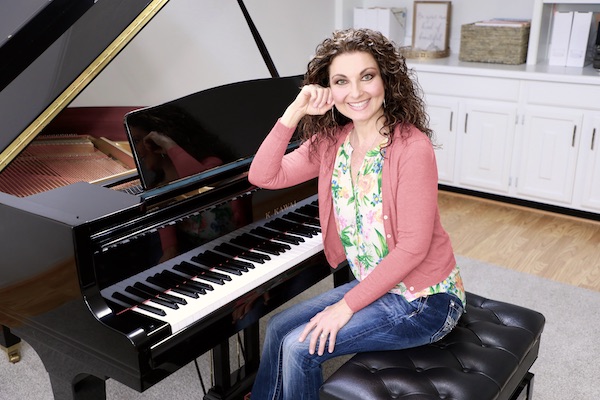
Hi! I’m Melody Payne, a pianist and piano teacher, educational resource author, a fun-loving wife to the most wonderful and talented hubby I could ask for, and a lifelong learner who loves to share. I want to make your life as a music teacher easier by writing and sharing helpful and relevant music teaching articles, and by creating educational resources with your very own students in mind. If you are a parent who wants to enroll your child in piano lessons, I’d love for us to get started building those skills that can give your child a lifetime of musical enjoyment!

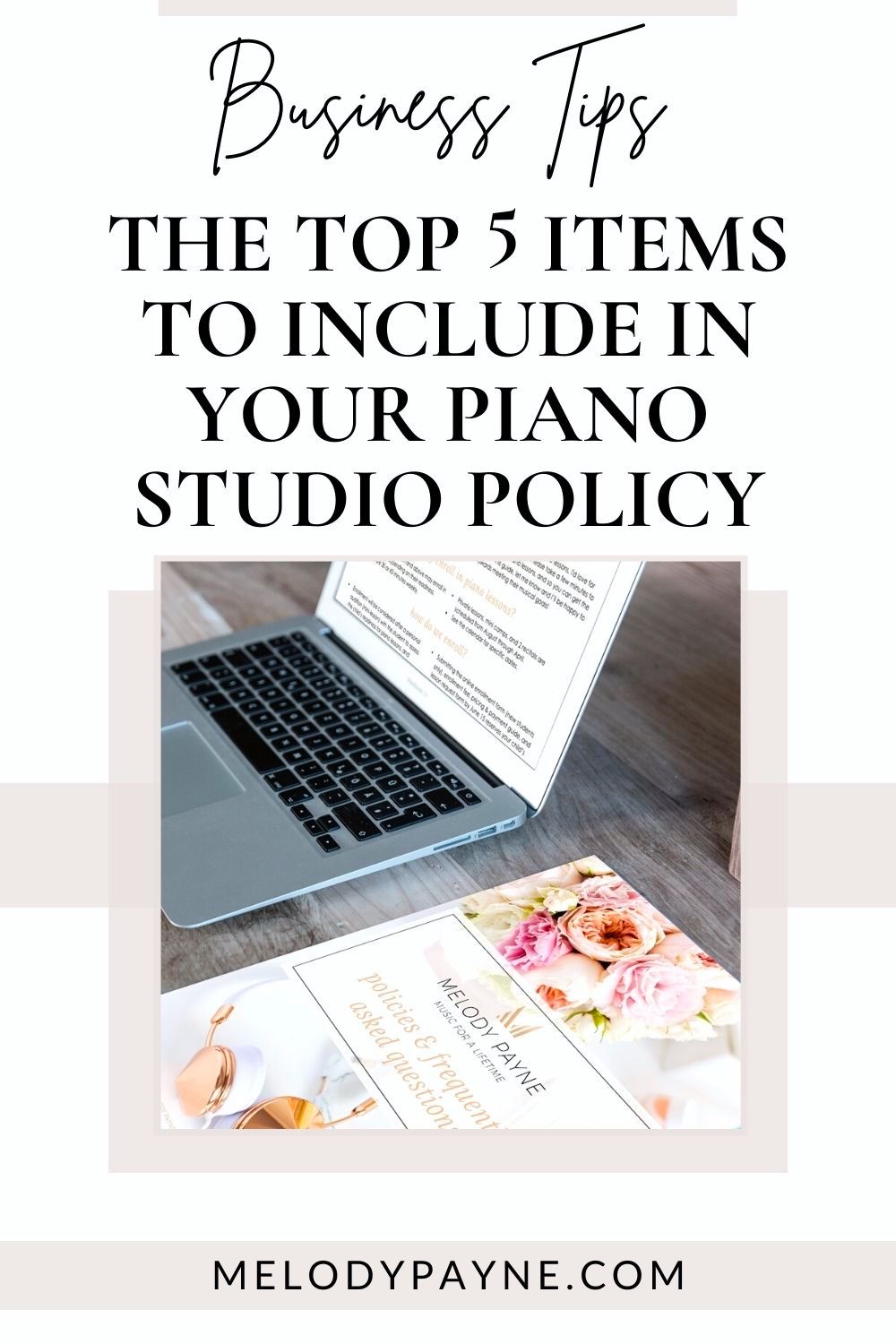
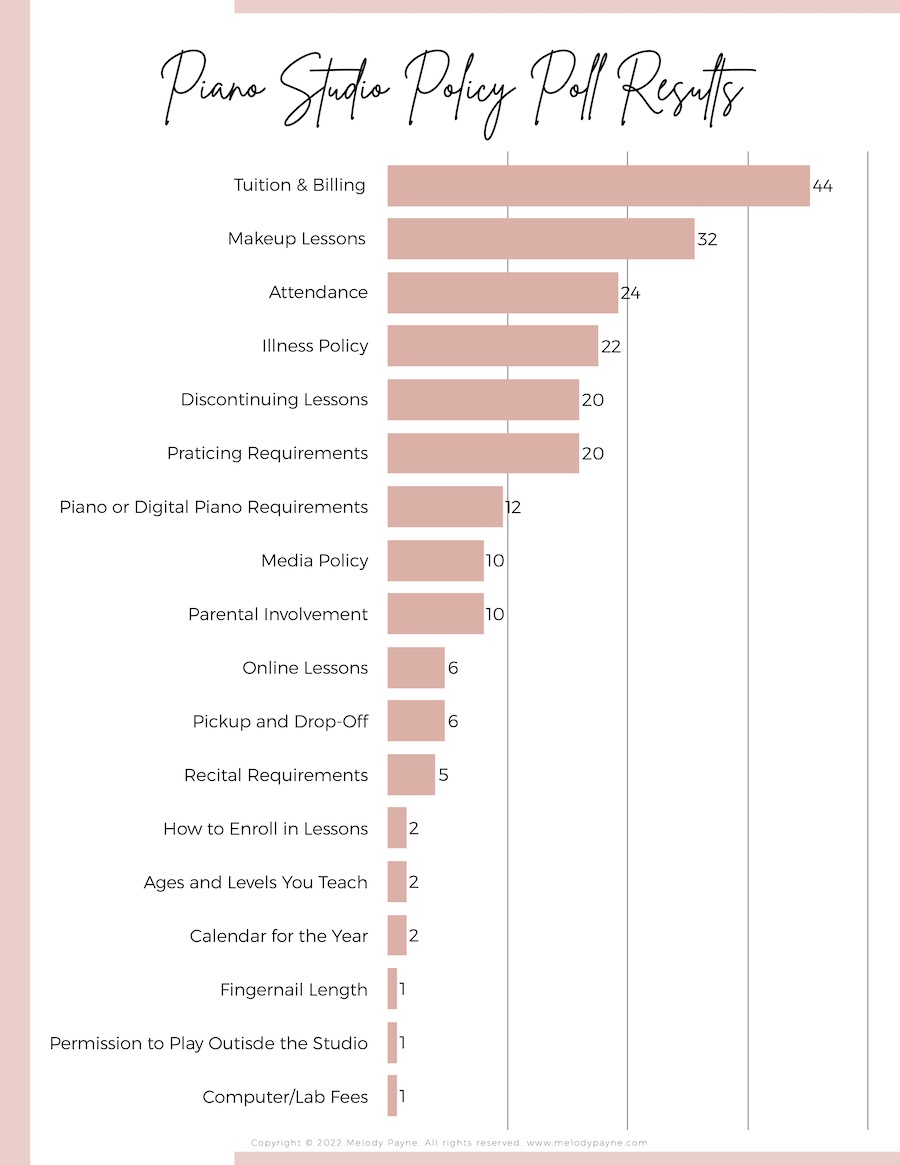


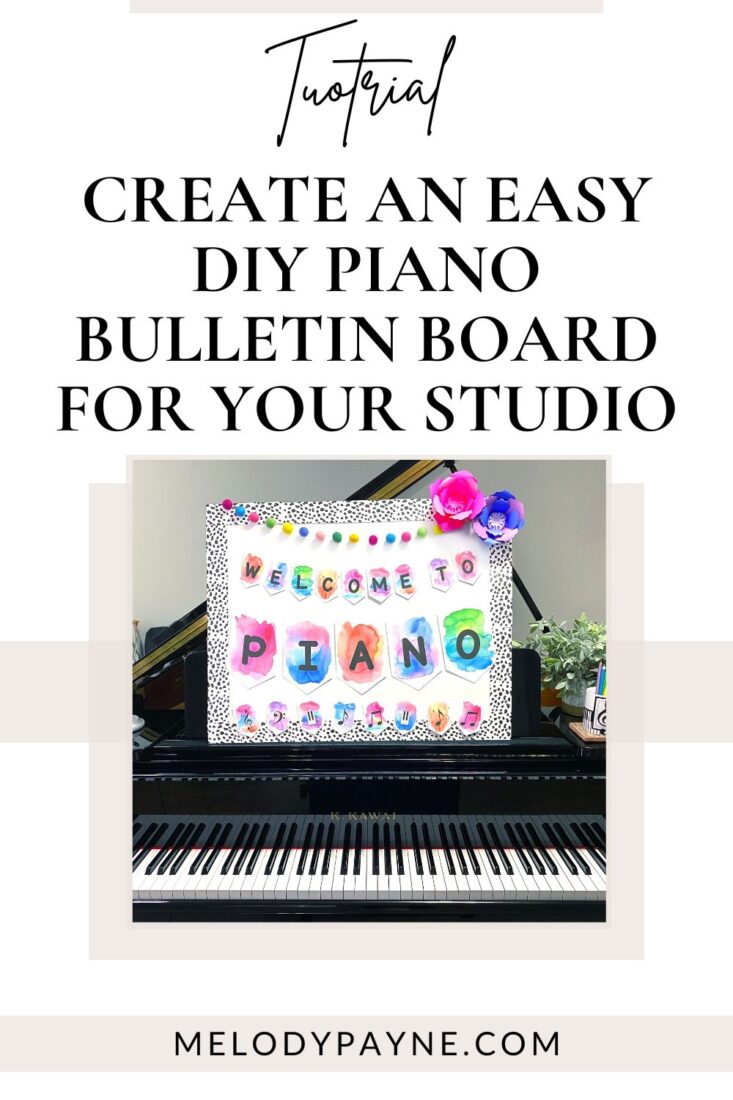

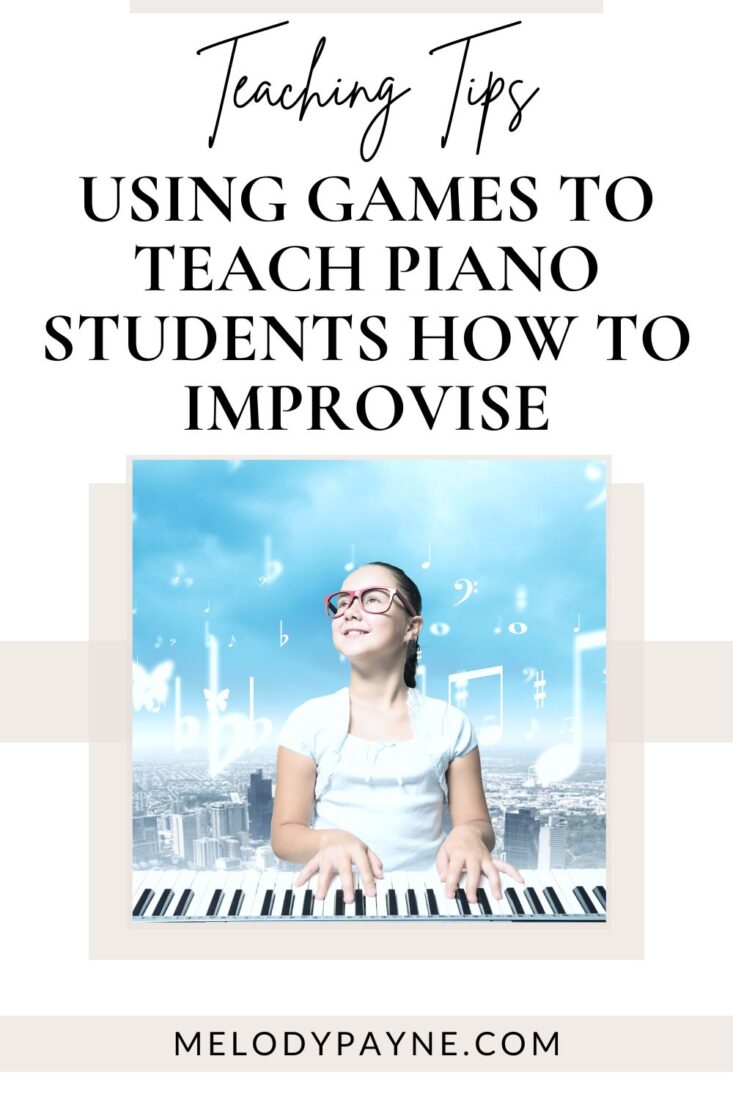

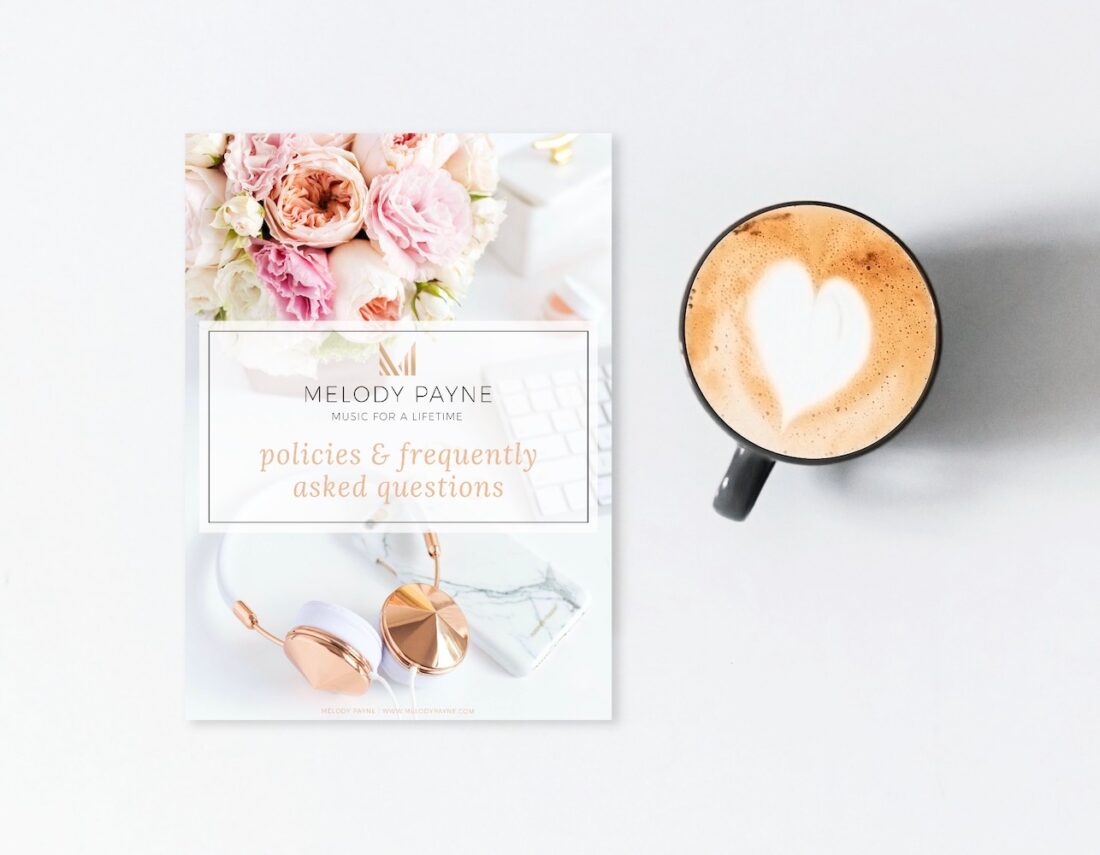
This Post Has 2 Comments
Hello Melody,
I am a piano teacher in Lexington, Virginia and was delighted to know that you got a degree from a Mississippi university. My degree is from MUW, gotten way back when dinosaurs roamed the earth. If you are ever up the valley please let me know you’re coming and maybe we can meet. Love all your ideas, policies, and advice. Best, Laura de Maria
Thank you so much, Laura, I’m so glad to hear that! I was in a summer program for high school students at MUW one year, and I really enjoyed being on campus! Thanks for letting me know about our MS connection. I always love connecting!
Melody